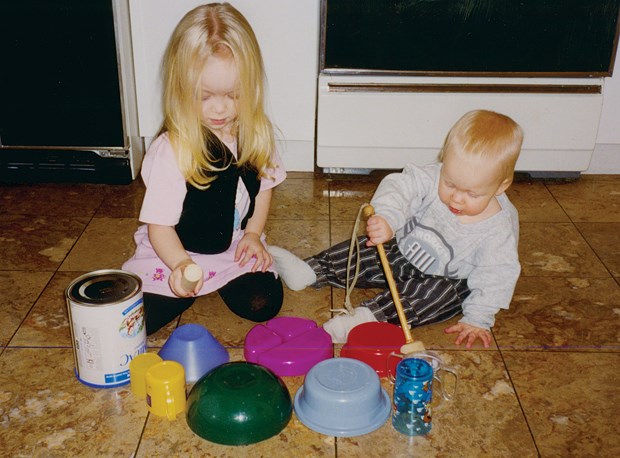"Play is the essence of childhood. If we want our kids to grow up to be self-sufficient and independent with good problem-solving skills, play is the place to start." (From But Nobody Told Me I'd Ever Have to Leave Home.) That all sounds just fine, but what does play actually look like? I would say that it is Purposeful and Pleasurable, involves Leisure and Learning, is Active and is revolves around You.
Play has a purpose but the player determines the purpose. The child decides what he wants to do when he is playing and it brings him pleasure. It is not mandated; he doesn't have to participate. It is his leisure time. But he is also learning.
Everything a child does is a learning activity. For this reason I do not like to label some toys as "educational." When my granddaughter tries to pull the zipper on my jacket, she is learning. My jacket is not an educational toy or even a toy but it is a source of learning for this child. She figures out that it depends on how she holds the zipper as to whether it will rise or fall. She learns that when she comes to the end it stops and if she takes it all the way to the bottom the jacket opens.
For her this is play. It has a purpose, it is her leisure, she is learning, it is active and she determined that this would be her game for the time being. Imagine, all this from an action we simply take for granted.
Play involves some activity; she is doing something. And the child chooses the play. If you are the player, it is about you. Play is spontaneous and voluntary. My granddaughter can choose to play with my zipper or not. It is her choice.
So, play has a purpose but it is not a structured activity with rules and regulations. This is the difference between play and sport or other organized activities.
When kids are involved in sports or games with rules they are having fun, getting exercise and learning all sorts of valuable skills. They are learning to be part of a team, to follow the rules, to listen to the coach and to take their place in the group.
All of this is valuable. But it is not true play.
Kids need to experience a range of play activities, from physical play to creative and imaginative play.
While play is childdirected, parents certainly have a role in supporting their children's play. Just let them take the lead and have fun with them. You can be playing as well.
There are times when we should stand back and just let our children play on their own. As a matter of fact, it's good practice to help them learn how to entertain themselves.
But at other times we can simply make ourselves available to our children.
If they do invite you to play, join them. If she wants to dance to the music on the radio, sweep her up in your arms and dance around the room. If she wants you to finger paint, put on old clothes or an apron and go to it.
You can support her play by providing toys and other tools for play. It might be a blanket so she can make a tent, pails and shovels for the beach or a sandbox or empty boxes for making structures.
Often, kids' play is determined by our attitude. When we see play as something that is earned and can only be enjoyed after everything else is done, we teach our kids that play is not important.
That is why the concept of educational toys was developed. Somehow, if the toy is labeled as educational it's not a waste of time.
Bottom line, play is the essence of childhood. Let your kids play, encourage all sorts of play and your child will grow to be a well-rounded, capable and happy young man or woman.
Kathy Lynn is a professional speaker and author of Who's In Charge Anyway?, But Nobody Told Me I'd Ever Have to Leave Home and Vive la Différence. If you want to read more, sign up for her informational newsletter at parentingtoday.ca.



